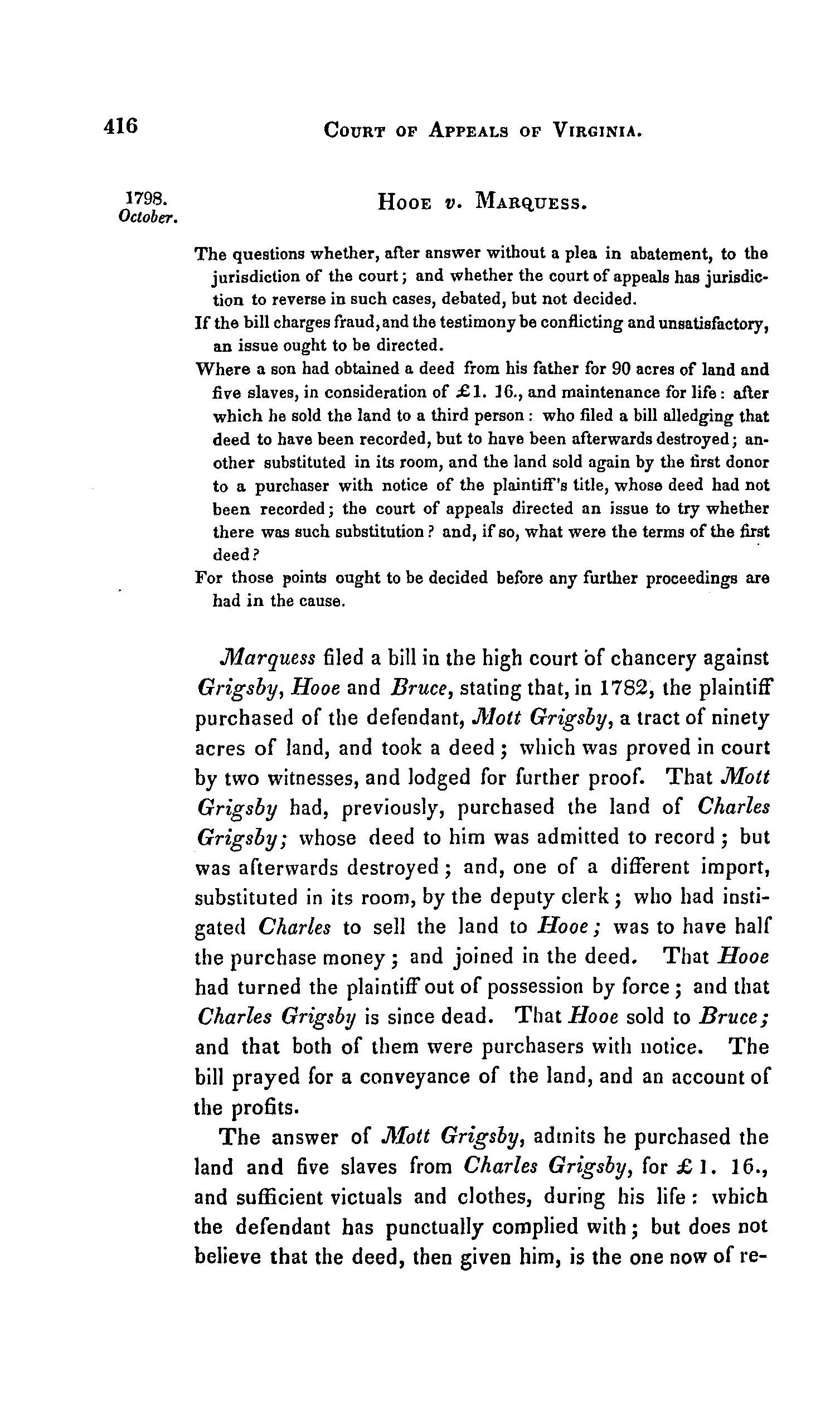Difference between revisions of "Hooe v. Marquess"
m (→Background) |
Mvanwicklin (talk | contribs) m |
||
| (5 intermediate revisions by 4 users not shown) | |||
| Line 1: | Line 1: | ||
{{DISPLAYTITLE:''Hooe v. Marquess''}} | {{DISPLAYTITLE:''Hooe v. Marquess''}} | ||
| − | [[File: | + | [[File:CallHooevMarquess1833v4p416.jpg|link={{filepath:CallsReports1833V4HooevMarquess.pdf}}|thumb|right|300px|First page of the opinion [[Media:CallsReports1833V4HooevMarquess.pdf|''Hooe v. Marquess'']], in ''Reports of Cases Argued and Decided in the Court of Appeals''], by Daniel Call. Richmond: R. I. Smith, 1833.]] |
| − | [[Media:CallsReports1833V4HooevMarquess.pdf|''Hooe v. Marquess'']], | + | [[Media:CallsReports1833V4HooevMarquess.pdf|''Hooe v. Marquess'']], 8 Va. (4 call) 416 (1798),<ref>Daniel Call, ''Reports of Cases Argued and Decided in the Court of Appeals,'' (Richmond: R. I. Smith, 1833), 4:416.</ref> was a case where the court determined how much testimony and evidence was necessary when a petition claimed the defendant fraudulently obtained land. |
==Background== | ==Background== | ||
| Line 17: | Line 17: | ||
__NOTOC__ | __NOTOC__ | ||
[[Category: Cases]] | [[Category: Cases]] | ||
| + | [[Category: Real Property]] | ||
Latest revision as of 10:14, 31 July 2018

Hooe v. Marquess, 8 Va. (4 call) 416 (1798),[1] was a case where the court determined how much testimony and evidence was necessary when a petition claimed the defendant fraudulently obtained land.
Background
Marquess sued Hooe and Bruce in the High Court of Chancery. Marquess claimed that in 1782 he purchased 90 acres of land from a man named Mott Grigsby, who had previously purchased the land from Charles Grigsby, since deceased. Marquess states that Charles Grigsby whose deed was recorded, but later destroyed then teamed up with the deputy clerk to create a substitute deed. This substitute deed was sold to Hooe and Grigsby and the clerk split the purchase money. Marquess claims that Hooe used this substitute deed to evict Marquess from the property and sold the land to Bruce. Marquess states that both Hooe and Bruce had notice of his previous purchase and prayed the court would convey the land back to him as well as account for the profits of the land.
The Court's Decision
Chancellor Wythe was of the opinion that the defendants were not entitled to the benefit of the substitute deed and found in favor of Marquess. The Court of Appeals reversed the decision.
See also
References
- ↑ Daniel Call, Reports of Cases Argued and Decided in the Court of Appeals, (Richmond: R. I. Smith, 1833), 4:416.